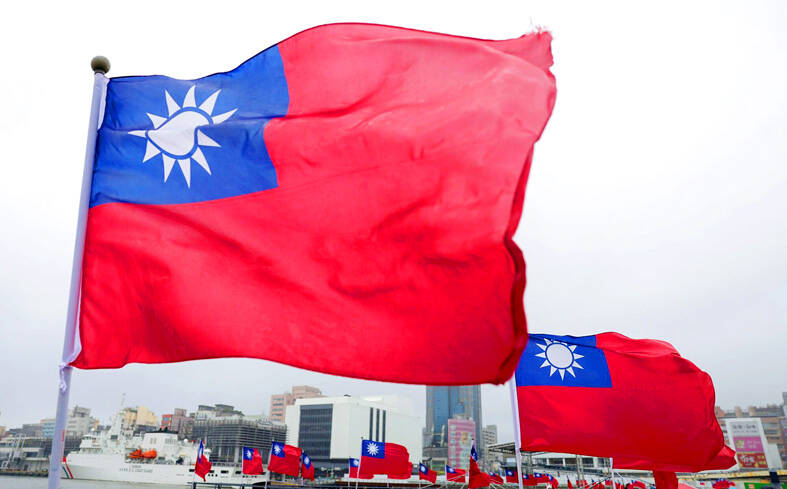A “new wave of disinformation” is heading across the Strait before the presidential election in January as Taiwan tries to combat China’s ever-shifting and increasingly subtle disinformation tactics, the New York Times reported.
Boasting “a resilience to foreign meddling that could serve as a model to the dozens of other democracies holding votes in 2024,” Taiwan “is ready for the disinformation onslaught” from China, the report said.
Taiwan has “one of the world’s most mature” communities of fact-checkers, government investments, international media literacy partnerships and a public sense of skepticism, it said.

Photo: I-Hwa Cheng, Bloomberg
“The challenge now is sustaining the effort,” it quoted Minister of Digital Affairs Audrey Tang (唐鳳) as saying.
Tang added that Taiwan now needs to “stay agile.”
Beijing’s efforts, such as criticizing Taiwan’s handling of the COVID-19 pandemic and launching cyberattacks when then-US House of Representatives speaker Nancy Pelosi visited Taiwan last year, “has struggled to sway public opinion,” it said.
Operations including the Taiwan FactCheck Center, Fake News Cleaner, Cofacts, Doublethink Lab and MyGoPen are providing fact-checking to help citizens ward off Beijing’s disinformation campaign, it said.
Many Taiwanese have developed internal “warning bells” for suspicious narratives, Fake News Cleaner cofounder Melody Hsieh (謝呈釀) said.
However, some fact-checkers and watchdog groups warned against “public apathy” towards fact-checking, the resources of which were not widely used in past elections, it said.
In addition, posts originating from China “appear increasingly subtle and organic, rather than flooding the zone with obvious pro-Beijing messages.”
Content farms under Beijing’s control might create false information, which would then be spread by agents, bots or unwitting social media users, it said.
Other tactics used by Beijing include buying established Taiwanese social media accounts and paying Taiwanese influencers to promote pro-China narratives, the report cited research from the RAND Corp as saying.
The Chinese disinformation campaign also shifted its focus from the relations between the two sides of the Taiwan Strait to Taiwan’s domestic issues to provoke social division, such as “spreading lies about local services and health issues,” it said.
In comparison to the last presidential election in 2020, Beijing is “no longer distracted by pro-democracy demonstrations in Hong Kong” and can take better advantage of artificial intelligence, such as creating deep fake videos or images, it said.
President Tsai Ing-wen (蔡英文) previously said that cracking down on disinformation is one of the “most difficult challenges for democracies” and requires “a whole-of-society effort.”

Chinese Nationalist Party (KMT) Chairman Eric Chu (朱立倫), spokeswoman Yang Chih-yu (楊智伃) and Legislator Hsieh Lung-chieh (謝龍介) would be summoned by police for questioning for leading an illegal assembly on Thursday evening last week, Minister of the Interior Liu Shyh-fang (劉世芳) said today. The three KMT officials led an assembly outside the Taipei City Prosecutors’ Office, a restricted area where public assembly is not allowed, protesting the questioning of several KMT staff and searches of KMT headquarters and offices in a recall petition forgery case. Chu, Yang and Hsieh are all suspected of contravening the Assembly and Parade Act (集會遊行法) by holding

PRAISE: Japanese visitor Takashi Kubota said the Taiwanese temple architecture images showcased in the AI Art Gallery were the most impressive displays he saw Taiwan does not have an official pavilion at the World Expo in Osaka, Japan, because of its diplomatic predicament, but the government-backed Tech World pavilion is drawing interest with its unique recreations of works by Taiwanese artists. The pavilion features an artificial intelligence (AI)-based art gallery showcasing works of famous Taiwanese artists from the Japanese colonial period using innovative technologies. Among its main simulated displays are Eastern gouache paintings by Chen Chin (陳進), Lin Yu-shan (林玉山) and Kuo Hsueh-hu (郭雪湖), who were the three young Taiwanese painters selected for the East Asian Painting exhibition in 1927. Gouache is a water-based

Taiwan would welcome the return of Honduras as a diplomatic ally if its next president decides to make such a move, Minister of Foreign Affairs Lin Chia-lung (林佳龍) said yesterday. “Of course, we would welcome Honduras if they want to restore diplomatic ties with Taiwan after their elections,” Lin said at a meeting of the legislature’s Foreign Affairs and National Defense Committee, when asked to comment on statements made by two of the three Honduran presidential candidates during the presidential campaign in the Central American country. Taiwan is paying close attention to the region as a whole in the wake of a

OFF-TARGET: More than 30,000 participants were expected to take part in the Games next month, but only 6,550 foreign and 19,400 Taiwanese athletes have registered Taipei city councilors yesterday blasted the organizers of next month’s World Masters Games over sudden timetable and venue changes, which they said have caused thousands of participants to back out of the international sporting event, among other organizational issues. They also cited visa delays and political interference by China as reasons many foreign athletes are requesting refunds for the event, to be held from May 17 to 30. Jointly organized by the Taipei and New Taipei City governments, the games have been rocked by numerous controversies since preparations began in 2020. Taipei City Councilor Lin Yen-feng (林延鳳) said yesterday that new measures by